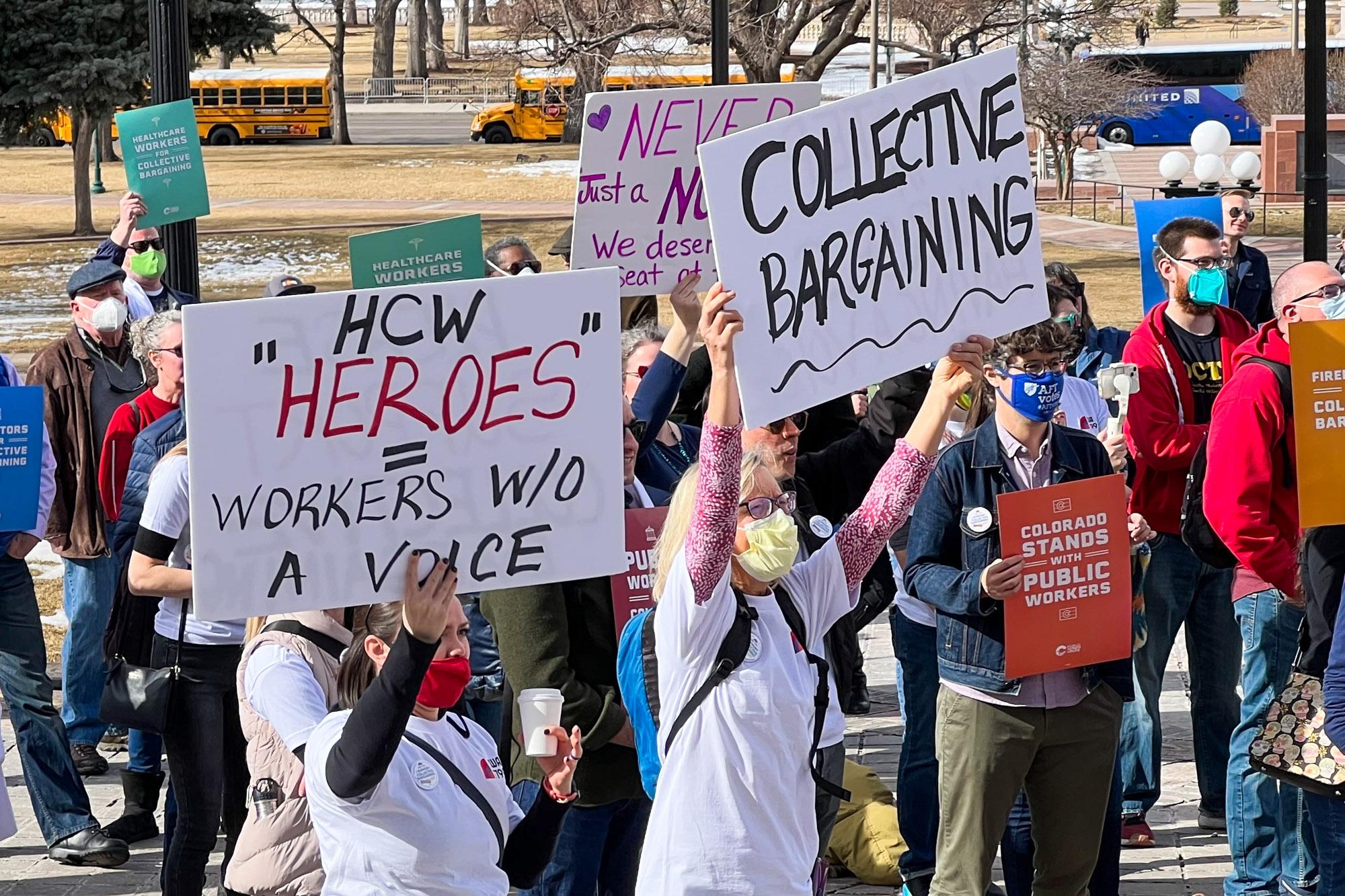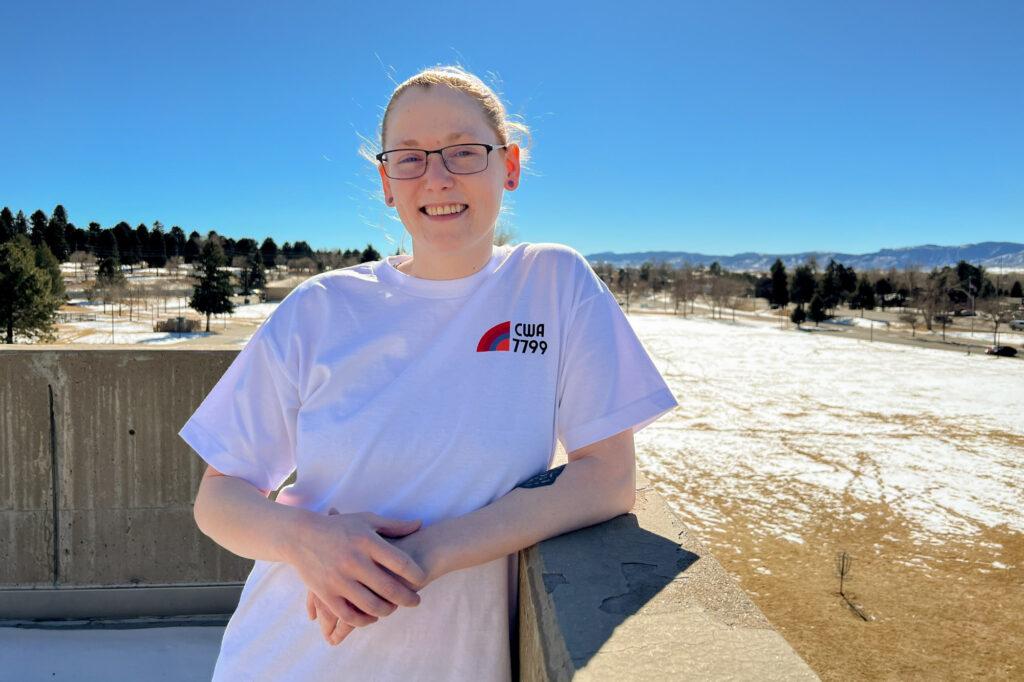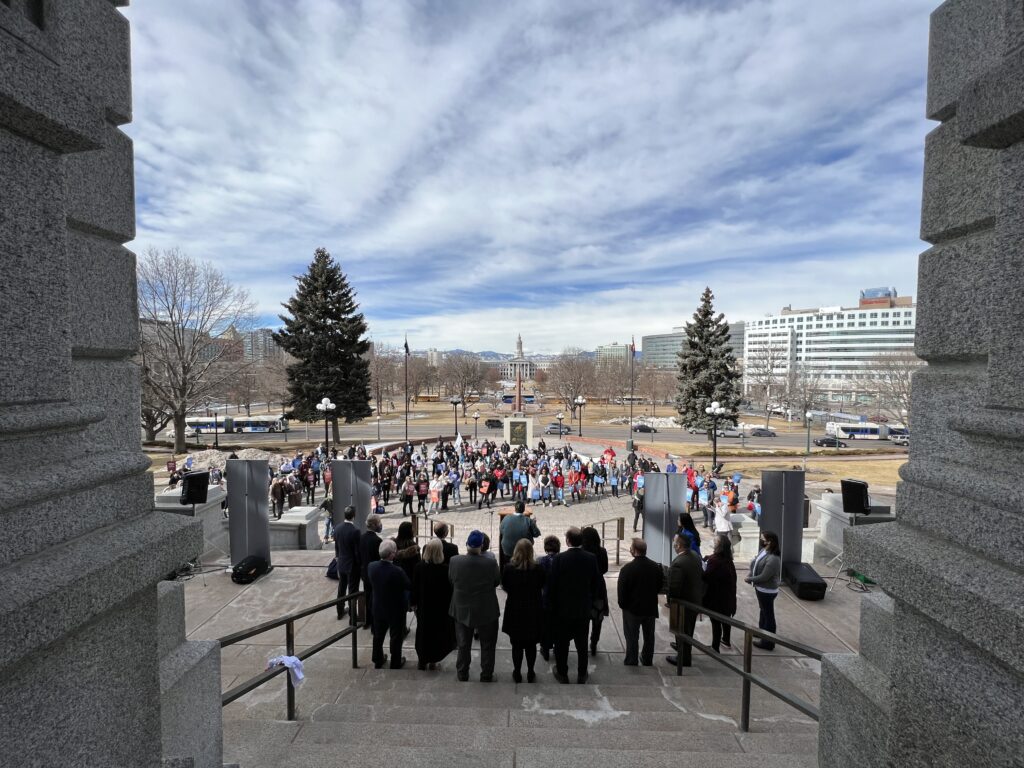
Sara Jungels, 35, left her home state of Indiana seven years ago in search of higher pay and better work in Colorado. At first, things looked promising: She’d be earning $13 an hour as a certified nursing assistant at Denver Health.
“So, I thought it was good — until I saw the rent prices,” Jungels said. Even after a raise to $17, she’s currently spending more than half her income on the rent for the Denver apartment where she lives with her husband, who’s been out of work recently due to illness.
To ease that crushing burden, Jungels has made two big decisions.
The first was to go back to school. She’s almost done with a nursing degree from Arapahoe Community College. She’s worked throughout the program but has had to pawn possessions and visit the school’s food bank to make ends meet.
“Anything that I can put in my pantry to have there in case we end up being under for that week is great,” Jungels said as she looked over shelves stocked with ramen and canned vegetables.
She hopes that graduating and getting a promotion will improve her finances. But that’s not the only thing she’s counting on — which is where her second decision comes in. Since 2020, she’s helped with a unionization effort that aims to organize workers at Denver Health, UC Health, the University of Colorado and Denver Public Library with Communication Workers of America Local 7799.
It’s something she couldn’t have imagined back home in conservative Indiana.
“I've never really been a part of any of this stuff, but I'm glad to help in whatever way I can — trying to make it better for everybody,” she said. She was motivated in part by seeing hospital executives take bonuses at the same time they asked employees to give up their vacation days, she said.
American labor organizers hope the nation may be at a turning point after decades of declines in union participation. In recent months, private-sector unions have made the news in Colorado for a strike at King Soopers stores and organizing drives at businesses like Spruce Confections in Boulder and at Starbucks stores.
However, workers like Jungels may not be able to fully participate in the movement; that’s because they work for Colorado’s local public employers, like cities, counties, public schools, universities and public hospitals like Denver Health. They can form unions, but unlike many private businesses, their employers are not required to engage in “collective bargaining” with them.
This year, some top Democratic lawmakers have a sweeping plan to change that — and it’s already become one of the most controversial topics at the statehouse.
The fight is not just pitting Democrats against Republicans. A bill has not yet been formally introduced, but the idea has already drawn howls of opposition from the organizations that represent cities, counties and rural schools. Most significantly, Gov. Jared Polis is a critic, saying the proposal must be dramatically narrowed.

'We can’t retain people'
In Colorado, collective bargaining for cities and other local public employers only happens with the approval of voters or local political leaders.
That permission can be hard to get. In 2019, Colorado Springs firefighters asked voters to approve collective bargaining —only to lose by a huge margin. It was a deflating defeat for union supporters.
“The amount of effort that was put in by the firefighters has me in disbelief,” said one supporter in an interview with The (Colorado Springs) Gazette. “I mean, we knocked (on) over 50,000 doors, so to see this sort of result is not even close to what I would have predicted.”
Today, only 15 of Colorado’s 272 municipalities have collectively bargained agreements with any part of their workforce, and almost all of those contracts are with police and firefighters. Just about a quarter of school districts have collective bargaining, too.
Even liberal cities like Denver offer bargaining to only a limited set of workers — and some of their employees want to see that change.
“We’re down 20 percent of our staff right now from pre-COVID. We can’t retain people,” said Nate Stone, a technology education administrator for Denver Public Library who is also involved in the organizing effort.
A union would not just fight for higher pay, but also could create a better relationship between workers and management, he argued, adding: “We would love any route that would take us to collective bargaining.”
In recent years, Democratic lawmakers have pushed to expand bargaining powers to more public workers in a variety of ways. A 2013 law was meant to make it easier for firefighters to bargain, though it’s ultimately made little difference, observers said. In 2020, a new law allowed about 28,000 state employees to collectively bargain, but it doesn’t apply to the state’s roughly quarter-million local government employees.
Today, Colorado is one of 23 states that either ban or limit collective bargaining for local employees, according to an analysis by the left-leaning Economic Policy Institute. The other 27 states require that local governments bargain with unions where they exist.
“There's a long history of public sector workers having been left out by our federal law,” said Jennifer Sherer, a senior state policy coordinator with EPI.
That has contributed to lower pay for important public jobs, Sherer said. In states with limited collective bargaining, like Colorado, local government jobs pay 16 percent less than equivalent private sector jobs, the EPI report found. In states where collective bargaining is more universal, it’s only a 9 percent deficit.
The pressure to expand public-sector labor rights has built during the pandemic, Sherer said, especially in the Mountain West.
In Colorado, top statehouse Democrats unveiled a draft of their proposal late last year. It would give a broad set of local public workers the guaranteed right to negotiate contracts for wages, benefits and more, if they form unions.
“Collective bargaining is a fundamental right that should be available to all Coloradans regardless of where they work,” said House Majority Leader Daneya Esgar in a December interview.
Esgar’s bill is to be co-sponsored by Sen. Steve Fenberg, who is soon to be the Senate president. However, more than a month into the session, it has yet to be introduced, as the sponsors work to build support — and tamp down opposition — behind the scenes.
The state vs. the local
The fight over collective bargaining is pitting state lawmakers against local leaders.
Some representatives of cities, school districts, and other public employers argue that the state proposal would take away their power to manage their workforces efficiently.
“I’ve never been so concerned about a piece of legislation and its impact as I am now,” said Michelle Murphy, executive director of the Colorado Rural Schools Alliance.
CRSA signed onto a recent letter from a coalition of opposed groups that criticized the proposal as a “top-down” approach that “would impose a significant unfunded mandate.”
They said they don’t oppose collective bargaining itself, but argued that dealing with unions — and potentially paying higher wages— could lead to unwanted new costs for taxpayers and take money from other areas, so the decision should be made locally.
“Where's the money to do that? The money never really comes,” said Scott James, a commissioner in Weld County.
Voters in that conservative county would “definitely not” approve collective bargaining on their own, James said. And forcing negotiations with a union would take away the budgeting authority of local leaders. Instead, he argued, the county is already motivated to provide good pay and benefits in order to retain its employees.
“Get with your fellow employees, get with your supervisors and come and talk to (the board of commissioners)” he suggested. “You don't need that collective bargaining. “
Kevin Bommer, executive director of the Colorado Municipal League, said that the current approach works. That’s demonstrated, he said, by the fact that relatively few local workforces have tried to win bargaining rights through the current method.
“If there was a problem out there, then you would see a lot more initiated questions (to create collective bargaining). You would see a lot more city councils, special districts and counties doing what they can already do,” he said. “It's just trying to address a problem that doesn't exist.”
But advocates for change say the current system discourages workers from organizing, especially in conservative areas where public opinion doesn’t support organized labor.
“It shouldn't matter where they live, where they work, as far as being able to have their rights,” said Andy Kerr, a commissioner for Jefferson County and former Democratic state lawmaker, who emphasized that he was speaking only for himself.
Kerr pushed back against the idea that unions will lead to out-of-control salary costs, noting the Jefferson County teachers’ union agreed to a pay decrease in the wake of the Great Recession to help the school district’s budget.
Successful negotiations have happened “literally thousands of times, all over the state of Colorado, with teachers, with firefighters, with police,” said Kerr, a former teacher.

The big question
Republicans are pushing back on the collective bargaining proposal, too, including through a bill of their own that would have banned public workers from striking. Democrats killed that measure this month, but conservative organizer Michael Fields said that liberal lawmakers are overstepping with their proposal.
“The fact that local governments are opposed to this, that cities are opposed, that counties, that school districts are — I think that proves that it's an overreach for Democrats right now,” he said.
Fields’ group, the Advance Colorado Institute, could go after the proposal on several fronts, if it passes. He said they would consider going to court to argue that it illegally overrides local powers. They could also potentially run a ballot initiative to require the state to pay for “incremental costs” caused by unionization, among other options.
Ultimately, though, much of this debate will come down to one person: Gov. Jared Polis. Spokesman Conor Cahill made clear in January that Polis would “not support the bill in its current form.”
Cahill pointed out that Polis signed the 2020 law that granted similar bargaining rights to state employees — but he emphasized that law had struck a balance “between collective bargaining and elected representation.”
At the time, the governor’s office called on Democrats to work more closely with local governments, and said Polis would consider “much narrower legislation.”
That’s led to weeks of negotiations behind closed doors. The conversation has included Democratic leaders in both chambers of the statehouse, the governor’s office and others. (The Municipal League, which is broadly opposed to any incursions on local power, has not been closely involved, Bommer said.)
No one working on the bill has said much publicly about how it might change, but other states offer examples. In some, bargaining laws exclude certain types of public workplaces. Or lawmakers might set limits on the ability of public workers to go on strike, as they did for state workers in Colorado.
In response to questions this week about the negotiations, the governor’s office stated only: “Conversations remain ongoing with the sponsors and that is all we will continue to say at this time.”
Democrats in the statehouse insist a bill is still coming. “It’s something that I knew was going to be a long road. We’re still making changes within the bill,” Esgar said this week.
Meanwhile, back at Arapahoe Community College, Sara Jungels is looking ahead to graduation this spring. The change from assistant to nurse — taking on those new responsibilities even as COVID-19 continues to cause chaos — makes her nervous.
“It’s been a little more anxiety provoking because of getting started in the middle of a pandemic, but I still wanna do it. I still wanna help people,” she said.
Her salary may nearly double with the change, to about $28 an hour, but she plans to keep pushing for unionization — both for herself and for the colleagues she’s seen working so hard during the pandemic.
“I really just hope that it gives us a seat at the table, that we feel like our concerns are being addressed, making sure that we are being taken care of,” she said, and ensuring “that we feel like we’re respected, and not just treated like warm bodies.”









